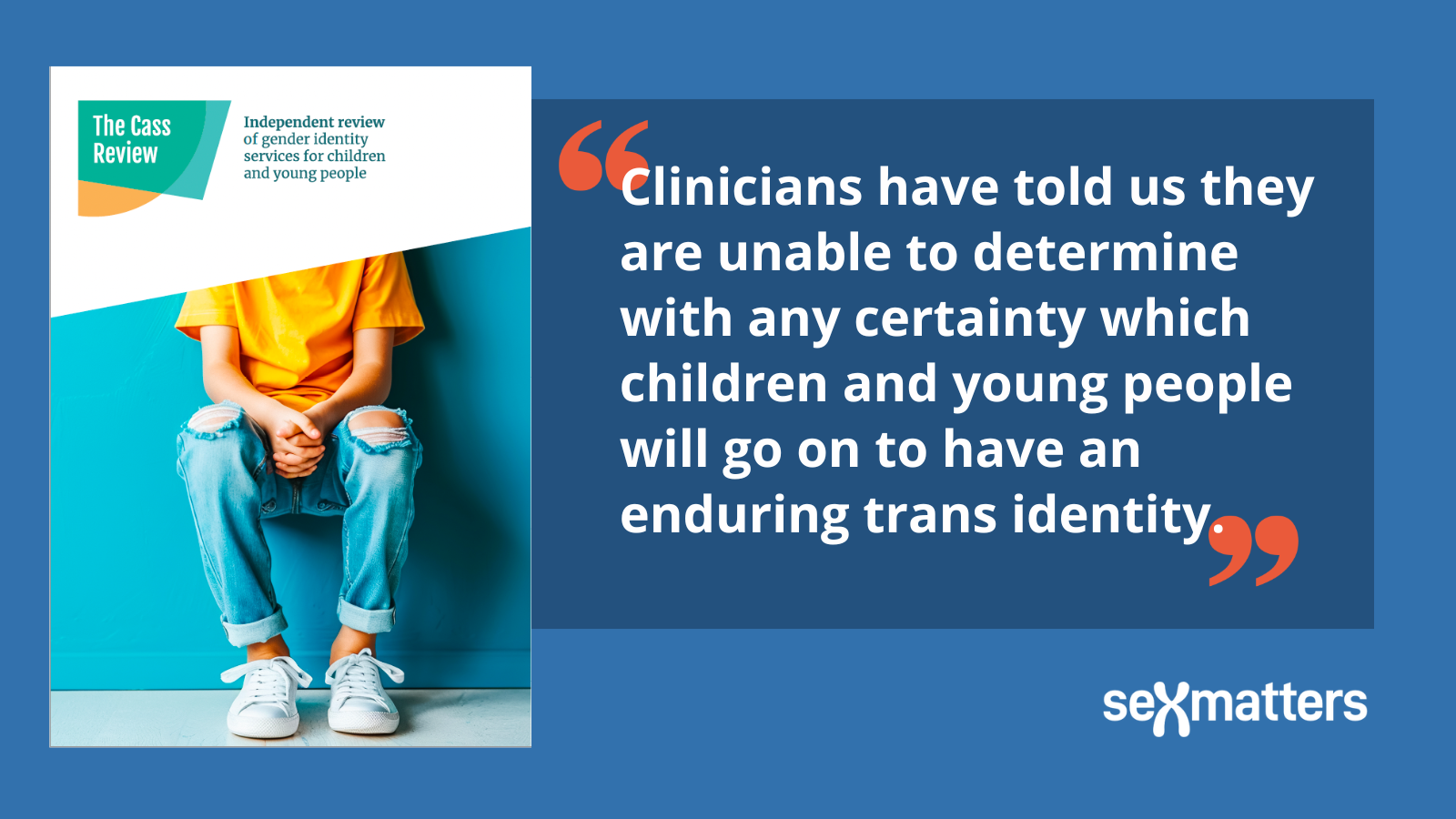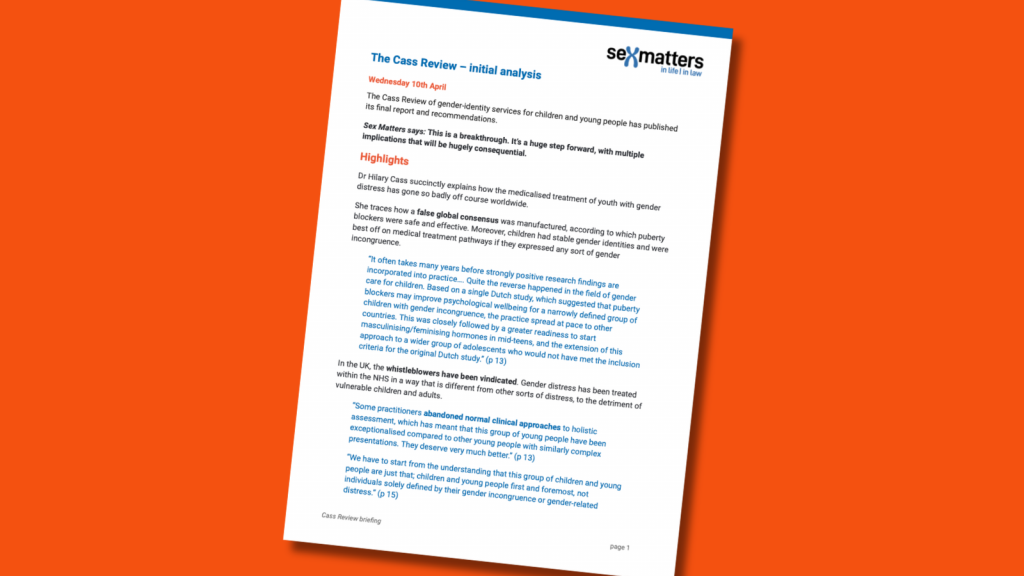The Cass Review is a damning indictment of what the NHS has been doing to children

Dr Hilary Cass has submitted her final report and recommendations to NHS England in her role as Chair of the Independent Review of gender identity services for children and young people.
Hilary Cass’s report demolishes the entire basis for the current model of treating gender-distressed children. Its publication is a shameful day for NHS England, which for too long gave vulnerable children harmful treatments for which there was no evidence base. It’s now clear to all that this was quack medicine from the start.
Dr Cass delivers stinging criticisms of NHS gender clinics, both adult and child, and her description of the Gender Identity Development Service is absolutely damning. It is disgraceful that GIDS, alongside the adult clinics, did not cooperate with her attempt to survey its practice, or to carry out a high-quality, long-term follow-up study on the treatment of children as part of the review, which would have been a global first.
Of course we regard some of the terminology that Cass uses on occasion – cisgender, assigned at birth, and calling boys who identify as girls “trans females” – as inaccurate, unscientific and confusing. But that does not detract from the many important points she makes in this groundbreaking report.
False claims revealed
Cass reveals how ideologues who put their pet theories ahead of protecting vulnerable and distressed youths created a false global consensus around GIDS’s dangerous approach. Those young people have been let down on an epic scale. Guidelines drawn up by the Endocrine Society and the World Professional Association for Transgender Health (WPATH) are revealed to be based entirely on low-quality sources, and to make claims of certainty without any justification. Tragically for British children, these were incorporated into the NHS approach in 2011, and have been leading our healthcare providers astray ever since.
The research carried out for the Cass Review by the University of York shows beyond doubt that WPATH is not a serious organisation. The NHS should now state definitively that it will not look to WPATH for evidence, for standards of care or for anything else. All references to it throughout the healthcare system should be removed.
Dr Cass’s report shows that it is simply false to claim that medicalising child gender distress – prescribing puberty blockers or cross-sex hormones – reduces suicide risk. This is the single most impactful claim made by proponents of so-called “gender-affirming care” – that if you don’t give a child these life-altering drugs, they are more likely to kill themselves. Dr Cass refutes it.
She suggests that there is no evidence supporting the use of puberty blockers, and that it should be exceptional to give cross-sex hormones to children between 16 and 18. This is the end of paediatric gender medicine as we know it.
Affirmation debunked
Dr Cass says many times throughout the report that clinicians, along with everyone else, have no idea which trans-identifying children will continue to identify as trans when they grow up. This kicks the legs out from under the whole idea of offering “transition” for gender-distressed youth.
If you take her report seriously – and you should: it’s a global standard-setter, far above anything produced anywhere else – you cannot possibly support a legal ban on so-called “conversion practices”. The ethical, careful, multi-disciplinary approach she advocates, in which a child’s gender distress is not “exceptionalised” but understood as just part of what’s going on for a child who is likely to have many other social and medical risk factors, is exactly what the proponents of a ban characterise as “conversion therapy”. They support gender affirmation – which, as Dr Cass’s report demonstrates, is unethical and unsupported by the evidence.
In particular, the Memorandum of Understanding (on conversion therapy in the UK) should now be torn up, since it’s based entirely on the debunked affirmative model. So should the various draft bills banning “conversion therapy”; all are now clearly out of line with the direction of travel and with Dr Cass’s steer for the future of NHS gender medicine.
There are hard questions to be asked about how professional and regulatory bodies and medical schools were captured by this evidence-free approach, but right now the most important thing is that the signatories recognise that they made a hideous error, and state publicly that they no longer endorse the MOU. One of Dr Cass’s recommendations is that medical leaders come together to “provide leadership and guidance on the clinical management of this population taking account of the findings of this report”.
The lowest standards
Dr Cass is clear that standards in this field have been woefully subpar, with children given treatments that lacked any evidence base. This might be excused temporarily, given that this is a fast-developing field, but what is inexcusable is that there has been no attempt to build an evidence base, and indeed Dr Cass’s own attempts to build one were “thwarted” by the adult and child NHS gender services. The most important overarching point in her report is that the standard of care for gender-distressed children has fallen far short of what this vulnerable population needs and deserves.
There are two places where Dr Cass seems to suggest that the institutional failings are so severe that individuals may need to be held to account. The first is in GIDS – her description of the abysmal quality of the medical notes of the youths referred for puberty blockers is absolutely shocking, and she pointedly quotes the guidance from the General Medical Council on medical records straight before that description. The second is in the gender clinics, both adult and child, that refused to cooperate with the data-matching required to carry out the world’s first robust long-term follow-up study for gender-distressed children seen by gender services. The heads, past and present, of these clinics should be held to account for this outrageous failure.
Dr Cass also mentions a “dog that didn’t bark”: the way that as soon as gender was raised, professionals at every level forgot everything they should have known about safeguarding. She says that safeguarding issues became overshadowed or confused, and major sources of risk got overlooked. These included bullying, breakdown in relationships with families, online grooming and social, cultural and religious pressures.
The review of GIDS found a “lack of apparent professional curiosity or concern in relation to risk and safeguarding”. Children referred onto the waiting list, especially by schools or voluntary-sector organisations, were not assessed for safeguarding and mental-health risks.
The NHS’s decision to issue new numbers for children who identified as members of the opposite sex created further, serious safeguarding risks. The consequences included young people subject to a child protection order not being identifiable as such when attending hospital; health records being lost; people who did not have parental responsibility being able to change a child’s name; children being re-registered as the opposite sex in infancy; and children on the child-protection register being untraceable after moving home.
New recommendations
It’s significant that Dr Cass recommends a transitional service for 18 to 25 year olds. She bases this on two considerations: first, that the current cut-off at age 18 is a particularly vulnerable point for patients, when mental health really seems to worsen; and second that brain maturation continues until age 25. This is formally outside her remit, so she must have felt particularly strongly about it – and will be welcomed by parents, who often watch heartbroken as vulnerable children on the waiting list for paediatric services “age out” and then get transferred to adult services with minimal gatekeeping.
It’s heartening to see her acknowledge and promote the need for specialist services for detransitioners. The careless and unethical way paediatric gender medicine has operated during the past decade means their number is likely to increase. These deeply traumatised victims of medical malpractice are unlikely to be well served by the very clinics that did them so much harm, and indeed Dr Cass acknowledges that separate care pathways and facilities may need to be developed for them.
Dr Cass’s remit solely concerned the NHS. However, she pulls every lever she possibly can to reduce and ideally end the provision of puberty blockers and cross-sex hormones by private providers. She reminds GPs not to prescribe “beyond their expertise” and pharmacists that they are “responsible for ensuring medications prescribed to patients are suitable”. Taken with her clear steer that neither puberty blockers nor cross-sex hormones have any evidence base for their use in under-18s, it would be a foolhardy doctor or pharmacist who offered or fulfilled a prescription for either outside NHS gender services.
A key omission
There is one big omission in what is otherwise a remarkably comprehensive and impressive piece of work. Dr Cass lists many factors that influence children to identify as trans, including the media, social-media influencers, friends and their own biology, but omits a particularly important one: schools.
Schools have been a key factor in celebrating and promoting the idea of “trans children” and most children who transition do so in school long before they ever see a specialist clinician. Dr Cass’s review points out that for a child, living “in stealth” – trying to conceal the fact of their actual sex from everyone around them – increases stress anxiety and mental-health problems.
We are glad to see her say that social transition will rarely be in a child’s interests, and particularly for a primary-aged child, and that it should almost never happen without parental consent. But she doesn’t take the final necessary step and register that it is simply not ethical or safe for a school to treat any child as having changed sex. It is impossible to keep either the trans-identified child or their classmates safe if the adults responsible for their safety aren’t completely clear at all times about the sex of all the children they are caring for.
Dr Cass does, however, say that what happens in school is important. This review is a landmark piece of work that gives education ministers all the ammunition it needs to drive gender-identity ideology out of the classroom. It gives the department and school leaders the evidence they need to remain focused on the wellbeing of children with gender distress and not get caught up in the fantasy that they are the opposite sex.
School leaders need to refocus on what the evidence says about supporting children with gender distress, and stop selling the fantasy of “gender transition” when the plain truth is that everyone has an unchangeable sex, and children cannot be kept safe and well when adults lie about that.
The reckoning
Anyone reading this review will come away with the understanding that those who have led NHS child and adult gender services over the past decade have serious questions to answer. And indeed Dr Cass says:
“There are clearly lessons to be learned by everyone in relation to how and why the care of these children and young people came to deviate from usual NHS practice, how clinical practice became disconnected from the clinical evidence base, and why warning signs that the service delivery model was struggling to meet demand were not acted on sooner.”
If not now, soon, there will have to be a wide-ranging inquiry into what went wrong, with a view to holding those responsible to account.

